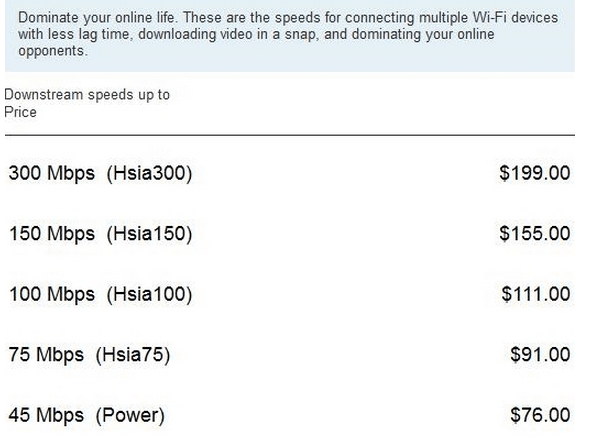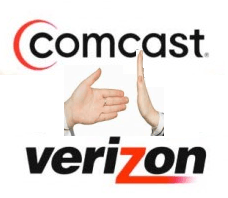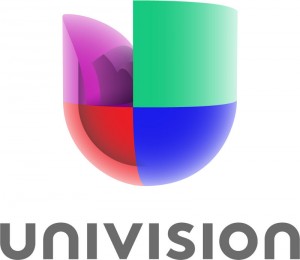 Just a few years after cable systems began upgrading to DOCSIS 3.0 to improve broadband speeds and performance through channel bonding, CableLabs is set to formalize next-generation DOCSIS 3.1 by the end of this month, allowing cable broadband speeds to reach well into the gigabits.
Just a few years after cable systems began upgrading to DOCSIS 3.0 to improve broadband speeds and performance through channel bonding, CableLabs is set to formalize next-generation DOCSIS 3.1 by the end of this month, allowing cable broadband speeds to reach well into the gigabits.
“We made a fairly bold assertion in October of last year that we would have them substantially complete and publicly issued by the end of 2013,” Matt Schmitt, director of DOCSIS at CableLabs said this morning. “This is quite a bit faster than we have ever pulled off before. It’s not a small project to do a new DOCSIS with a new physical layer underneath. It was an industry-wide effort and I tell you what, they’ve been busting their tails.”

Schmitt
Schmitt discussed the new standard at the DOCSIS 3.1 Engineering Pre-conference Symposium held in Atlanta.
The new standard for cable broadband was designed to protect the industry from competing technologies — notably fiber to the home service which offers immediate gigabit broadband capacity. DOCSIS 3.1 was designed to support up to 10/1Gbps speeds using larger spectrum bands cable operators are opening for data services after switching off analog cable television channels.
Cable operators are not expected to offer gigabit broadband service in most areas. Many operators still dedicate the largest amount of their available bandwidth to analog cable television channels. But DOCSIS 3.1 provides scalability as operators move towards digital television delivery. It also offers 50 percent more data capacity over DOCSIS 3.0 over the same spectrum.
DOCSIS 3.1 uses a new modulation scheme coupled with more robust forward error correction (FEC) to improve efficiency and performance. The new standard dumps Reed-Solomon FEC in favor of low-density parity check (LDPC) technology. DOCSIS 3.1 relies on orthogonal frequency division multiplexing (OFDM), also used by wireless carriers to boost performance over limited spectrum.
Despite the new standard, DOCSIS 3.1 will be fully backwards-compatible with DOCSIS 3.0, which means customers buying their own cable modems will not find them obsolete anytime soon. When a customer decides they want faster broadband speeds, the cable operator can advise if a new DOCSIS 3.1 modem is needed. In most cases, it will not.
Most cable operators are expected to take at least a year lab testing the new technology and waiting for vendors to incorporate support for DOCSIS 3.1 in future generations of cable broadband equipment.
Comcast, one of the more speed-aggressive cable operators likely to be an early adopter of DOCSIS 3.1, indicated it would probably be 2015 before customers can buy DOCSIS 3.1-powered products. But Comcast will begin trials next year, according to Jorge Salinger, vice president of access architecture.
Time Warner Cable plans to use the next generation of DOCSIS as they migrate from conventional MPEG-based video delivery to IP video transport on a Converged Cable Access Platform (CCAP). But Time Warner Cable customers don’t usually get the fastest possible broadband speeds. For most of the country, the cable operator’s top speed is 50/5Mbps.
[flv width=”640″ height=”380″]http://www.phillipdampier.com/video/Speaker Interview with Ralph Brown of Cable Labs at Cable Congress 2013 in London 3-11-13.mp4[/flv]
Ralph Brown, chief technology officer of CableLabs, talked about DOCSIS 3.1 and the cable industry’s future technology needs in this interview from March 2013. (5 minutes)
![]() New York regulators have turned down Time Warner Cable’s request to shut off past due phone customers late at night or on weekends to protect consumers.
New York regulators have turned down Time Warner Cable’s request to shut off past due phone customers late at night or on weekends to protect consumers. “We are saying ‘no’ to Time Warner’s request to waive our rules regarding when it would be authorized for suspensions and terminations of its telephone customers,” said Commission chair Audrey Zibelman. “The Commission’s rules applicable to Time Warner are consistent with the hours of operation of the Commission’s consumer call center which receives consumer complaints’ and requests for assistance. To ensure telephone consumers’ rights are protected, especially core customers such as the elderly and disabled, it is essential customers are afforded the opportunity to contact our call center if their telephone service is threatened with a potential suspension or termination.”
“We are saying ‘no’ to Time Warner’s request to waive our rules regarding when it would be authorized for suspensions and terminations of its telephone customers,” said Commission chair Audrey Zibelman. “The Commission’s rules applicable to Time Warner are consistent with the hours of operation of the Commission’s consumer call center which receives consumer complaints’ and requests for assistance. To ensure telephone consumers’ rights are protected, especially core customers such as the elderly and disabled, it is essential customers are afforded the opportunity to contact our call center if their telephone service is threatened with a potential suspension or termination.”

 Subscribe
Subscribe

 Just a few years after cable systems began upgrading to DOCSIS 3.0 to improve broadband speeds and performance through channel bonding, CableLabs is set to formalize next-generation DOCSIS 3.1 by the end of this month, allowing cable broadband speeds to reach well into the gigabits.
Just a few years after cable systems began upgrading to DOCSIS 3.0 to improve broadband speeds and performance through channel bonding, CableLabs is set to formalize next-generation DOCSIS 3.1 by the end of this month, allowing cable broadband speeds to reach well into the gigabits.
 A joint venture between Verizon, Comcast, and Time Warner Cable to explore the development of innovative new services delivered across cable and wireless networks has been terminated, according to Fran Shammo, Verizon’s chief financial officer.
A joint venture between Verizon, Comcast, and Time Warner Cable to explore the development of innovative new services delivered across cable and wireless networks has been terminated, according to Fran Shammo, Verizon’s chief financial officer. A new agreement between Time Warner Cable, Bright House Networks, and Univision Communications will add at least three new Latino-oriented cable networks to the television lineup beginning as early as next month.
A new agreement between Time Warner Cable, Bright House Networks, and Univision Communications will add at least three new Latino-oriented cable networks to the television lineup beginning as early as next month.